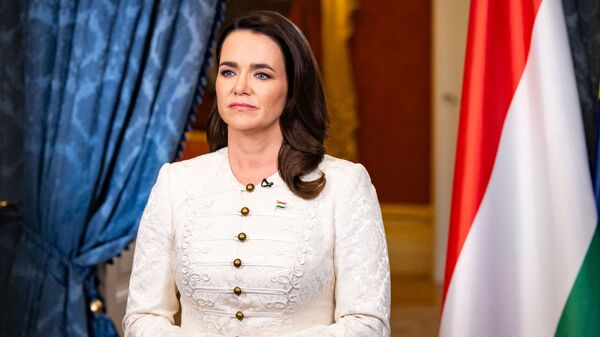In a startling turn of events, Hungarian President Katalin Novak, a staunch ally of Prime Minister Viktor Orban, has tendered her resignation following public outrage over a controversial pardon granted to a man implicated in a child sexual abuse case. The decision to pardon a former deputy director of a children’s home, who played a role in covering up his boss’s heinous acts, has ignited a firestorm of criticism and led to widespread protests outside the presidential palace.
The saga unfolded when independent news outlet 444 exposed the pardon last week, triggering a wave of condemnation from opposition politicians and civil society. Novak, who had been serving as Hungary’s first female president since March 2022, faced mounting pressure to step down as calls for accountability reverberated across the nation.
Acknowledging her misstep, Novak expressed remorse for her actions, stating, “I apologize to those who I hurt and all the victims who may have had the impression that I did not support them.” She reaffirmed her commitment to safeguarding children and families, but the damage had been done, prompting her resignation.
The controversy deepened further with the withdrawal from public life of another Orban ally, former justice minister Judit Varga, who had approved the contentious pardon. Varga’s abrupt exit underscored the gravity of the situation and highlighted the ramifications of the scandal within Hungary’s political establishment.
As the fallout intensified, demonstrators converged outside the presidential palace, demanding accountability and transparency. The swift succession of resignations from key figures close to Orban underscored the magnitude of the crisis engulfing his government.
Hungary’s opposition seized upon the moment to denounce Orban’s leadership, with MEP Anna Donath asserting, “No important decision can be taken in Hungary without Viktor Orban’s approval.” The onus fell squarely on Orban to address the growing discontent and provide clarity on the circumstances surrounding the pardon.
In a bid to quell public anger, Orban announced plans to amend Hungary’s constitution to preclude the possibility of pardoning individuals convicted of paedophilia. However, questions lingered over the lack of accountability and transparency surrounding the pardon, casting a shadow over the government’s commitment to combating sexual abuse and protecting vulnerable individuals.
Novak’s resignation has reverberated through Hungary’s political landscape, leaving behind a void in leadership and exacerbating the gender imbalance within Orban’s cabinet. With no women currently serving in the 16-man cabinet, the departure of Hungary’s first female president underscores the challenges faced by women in attaining positions of influence and authority in the country’s political sphere.
As Hungary grapples with the fallout from this scandal, the resignation of Katalin Novak serves as a stark reminder of the imperative for accountability, transparency, and the protection of the most vulnerable members of society. In the wake of this crisis, the nation stands at a crossroads, poised to confront its shortcomings and forge a path forward guided by integrity, compassion, and justice.
